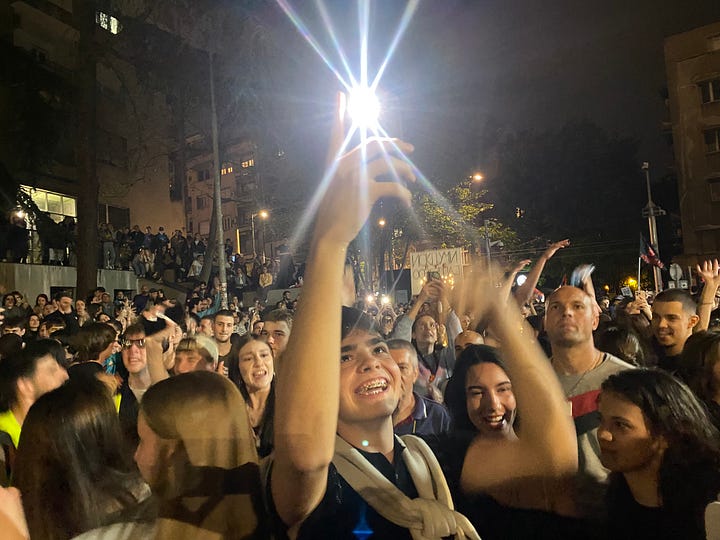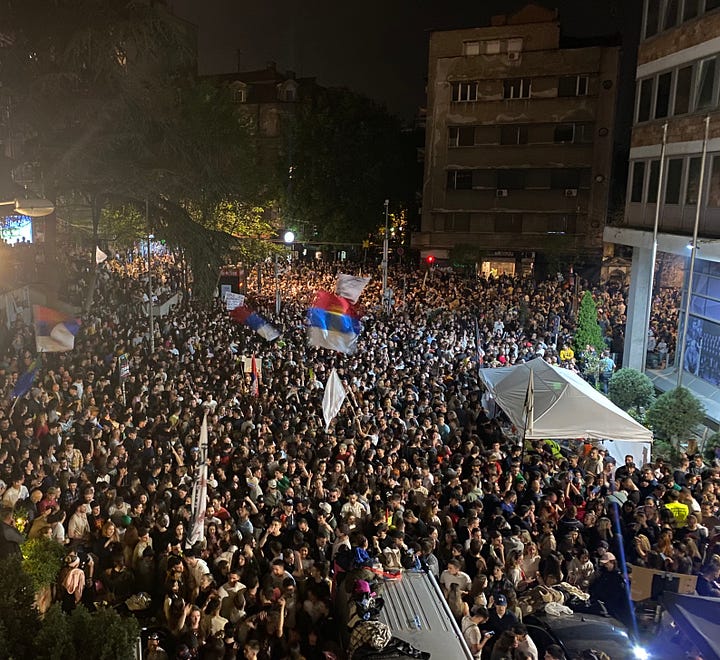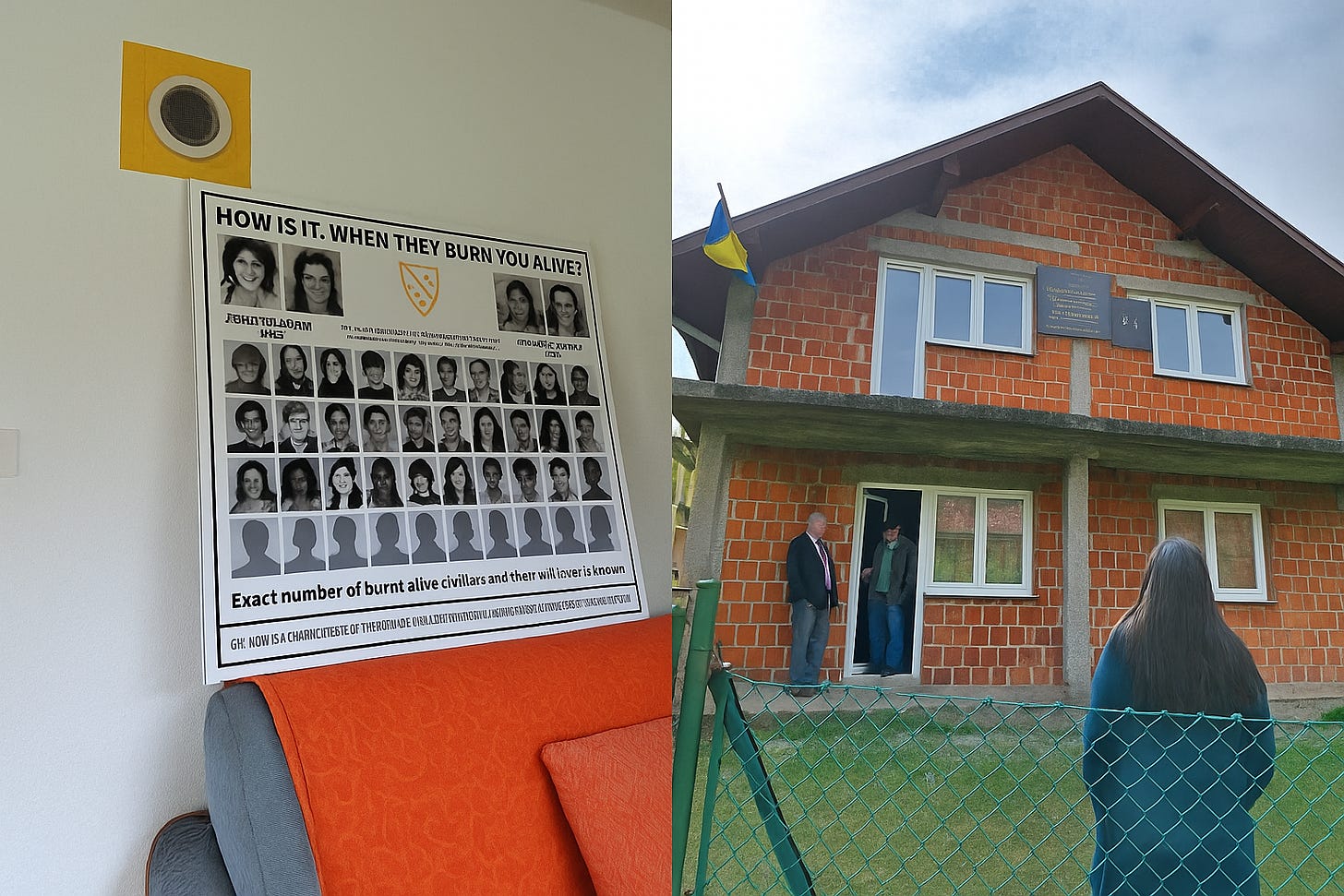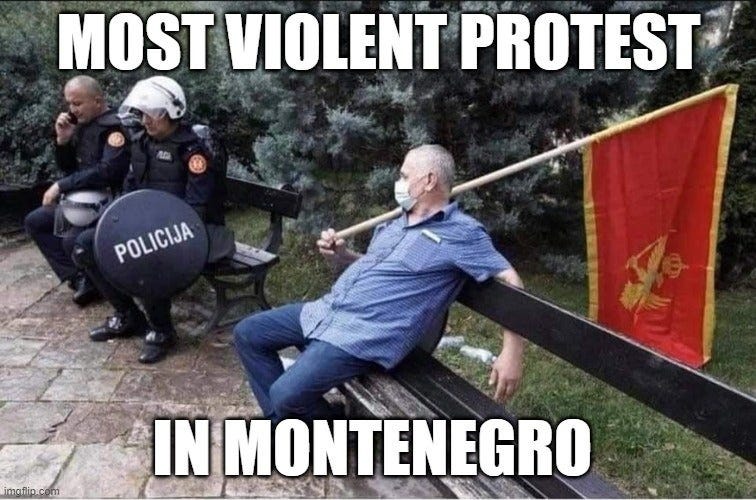"Balkan Unscripted #6 - Lost in Višegrad
Hello all,
Last week, I (Marjolein) traveled to Bosnia and Herzegovina (BiH) with a team to record a podcast for a longer multimedia project I’m currently working on. One of our stops was Višegrad — a city marked by horrific war crimes committed in 1992 during the Bosnian War. The weight of its history is palpable the moment you arrive.
For example, when you enter the town, a billboard displays a photograph of Milorad Dodik, the president of Republika Srpska, alongside the words: “They brought me to trial because they couldn’t put a million Serbs in the courtroom!” With propaganda like this, Dodik is trying to frame the arrest warrant recently issued against him by the BiH’s Prosecutor's Office as an attack on the Serb people as a whole. But — will Dodik actually be arrested? If so - when? By whom? And what will follow from that?
But today, I want to tell a different story.
When we visited Višegrad, our goal was to find Bikavac — a house where, according to the International Criminal Tribunal for the Former Yugoslavia (ICTY), at least 60 Bosniak civilians were burned alive. Their bodies were never recovered. The house was later completely destroyed, as if trying to erase any trace of what happened there. We knew we might find nothing. But that was precisely why we wanted to go. The absence itself speaks volumes — a haunting symbol of genocide denial.
Earlier that day, we visited a local cemetery. A caretaker gave us directions: “Go straight past the tire repair shop, then turn right,” he said. “You’ll see a Bosnian flag — you can’t miss it.” But we did. After circling the area three times and finally asking a man wearing a jacket with a Russian flag on it, we finally saw someone waving in the distance. It was the cemetery caretaker — he had come to find us himself.
Above the scene where we should have turned right and where two retired men are spending their days waiting for visitors to Bikavac. We expected to find an empty area. Instead, we discovered a newly built house with a plaque commemorating the massacre. Next to it is a photo of Zehra Turjačanin— the only woman who survived. Inside, there’s the start of a private museum: a small memorial to the victims.
Although our time in Višegrad was heavy with sorrow, visiting that particular house also offered a sense of hope — hope in the fact that someone chose to rebuild it with purpose, and that two retirees are dedicating their days to guiding visitors. A country can only begin to heal from genocide if the truth is acknowledged. This place stands as a powerful example of that first step. If you ever find yourself in Višegrad, make sure to visit Bikavac. (To save you the trouble of searching, here’s the exact location).
It’ll be a while before the podcast is ready — the next few weeks will be spent deep in the editing trenches. I’m still not sure whether the story of Bikavac will make the final cut. The Višegrad episode might force us to “kill a few too many darlings”. It’s an almost impossible task — so wish me luck. And the cat below? If you listen closely, you might just catch the occasional purr or meow in the background.
Živili,
Marjolein and her reporting buddy
What you need to know
Last Saturday, Vladan Đokić, the Rector of the University of Belgrade, was summoned to the Criminal Police for questioning. The investigation focused on potential charges of abuse of official position. The summons follows Đokić’s public support for the student movement, which has been staging protests and blocking university activities for several months. In a display of solidarity, hundreds gathered outside the Criminal Police Department on Friday morning, chanting slogans such as 'We won’t give up our rector.' Many of Đokić’s colleagues at the protests called the summons politically motivated and overall inappropriate. After the questioning, Đokić said: “I hope the academic community remains united and in solidarity.”
Serbia’s student movement are blocking the public broadcaster RTS in Belgrade. As there was some fear that the police would try to unblock the building over Easter, students from Novi Pazar, a predominantly muslim city in the south of Serbia, motor bikers and war veterans came out to support the student movement. Some RTS journalists are supporting the students, which has led to interesting news broadcasts.


On Saturday night, students from the university of Novi Sad and citizens welcomed home the students that cycled to Strasbourg, to appeal to European institutions. Photos were taken at the welcoming of these students at the campus of Novi Sad.
Planning a new democracy. Some media found the students protests hard to grasp. What do they want? Why are they not working with the opposition? This opinion piece from Suzana Ignjatovic explains how the students are renewing democracy by holding plenums. “As a student-approved method, plenums are currently the source of legitimacy for ongoing protests and democracy repair, not a revolutionary method.”
However, yet others have grown more skeptical about the long-term impact of the politically non-aligned student movement. After months of protesting, many students are exhausted, and some are running out of money, forcing them to seek work. Meanwhile, Vučić is playing a 'waiting game,' while implementing what students are calling 'revenge laws' targeting the education sector (more on that in next issue).
In other news
Lithium for Dodik. Republika Srpska’s government is pushing forward a controversial lithium mining project in the Majevica region despite strong local opposition and serious environmental concerns. The project, Radar Nova reports, raises fears of greenwashing and long-term ecological damage. Read this piece by Sasa Dragojlo.
Italy is sending more migrants to Albania, after previous attempts to use the new migrant reception centers in Shëngjin were blocked due to conflicts with international law, as ruled by the European Court of Justice. Italy has now found a new approach by sending individuals housed in so-called Repatriation and Detention Centres—those whose asylum applications have been rejected, who have been issued expulsion orders, or who have violated the terms of their stay. This move could serve as a model for the EU's broader plan to establish ‘return hubs’ outside its borders."
Meme of the week
Just for the laughs! (And, for some context, check out Marjolein’s story for VRT about the truly one-of-a-kind 'championship' of lounging in Brezna, a village in Montenegro. For nearly a month and a half, contestants lay in bed, doing nothing.
Tips
Read this beautifully illustrated piece about about migration: “The Testimony Of A Syrian in Kosovo. How I Fled The War But Remained Trapped In Pristina". In this story, a Syrian refugee recounts escaping the Syrian conflict only to face new challenges in Kosovo. Despite finding physical safety, he struggles with bureaucratic hurdles and limited opportunities, leaving him in a state of limbo. The story highlights the emotional toll of displacement and the difficulties refugees encounter.
This weekend, Serbian Orthodox Christians gathered to celebrate Easter at Belgrade's Saint Sava Church. Enjoy this beautiful song from these talented kids:
Lidija Zelovic film Home Game is now showing in Dutch cinemas. Lidija was born and raised in Sarajevo, where she worked as a news broadcaster when the war broke out. After fleeing to the Netherlands, she began documenting her life. Home Game is the third chapter in a deeply personal documentary series about her family. In it, she draws parallels between the current political climate in the Netherlands and Europe and that of Bosnia in the late 1980s and early 1990s.
Hi, from us
We’re Ingrid & Marjolein, two freelance journalists covering the Balkans. One Saturday night — after a few glasses of rakija — this newsletter was born. In each edition, we share stories that catch our eye, the ones worth reading, along with our observations from reporting in the region. So grab a coffee (or a rakija) and join us.











